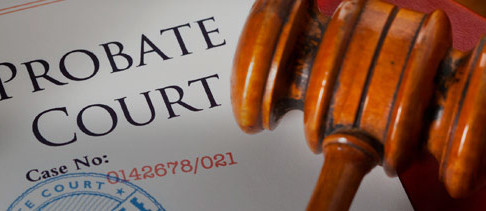The Hierarchy of Payments From an Estate in Maryland

During the process of administering an estate, you might discover that the assets in the estate are not sufficient to pay all claims made against the estate. If you find yourself in this situation as a Personal Representative, Maryland law specifies a hierarchy of payments. The hierarchy is as follows: 1. Fees due to […]
 Posted by reichertlegal
Posted by reichertlegal- Posted in Estate Administration Attorney Maryland, Estate Administration Baltimore County Maryland, Estate Administration Baltimore Maryland, Estate Administration Carroll County Maryland, Estate Administration Frederick Maryland, Estate Administration Lawyer Maryland, Probate Attorney Baltimore Maryland, Probate Attorney Columbia Maryland, Probate Baltimore County Maryland, Uncategorized
 Jan, 27, 2024
Jan, 27, 2024 No Comments.
No Comments.
What is the Role of a Personal Representative?

A Personal Representative (aka executor) is a person appointed in an estate plan, or, when there is no will, appointed as a matter of law or by the court. This role involves ensuring that the decedent’s wishes are fulfilled when distributing assets, as well as managing the decedent’s affairs, including paying taxes and other bills. […]
 Posted by reichertlegal
Posted by reichertlegal- Posted in Estate Administration Baltimore County Maryland, Estate Administration Baltimore Maryland, Estate Administration Carroll County Maryland, Estate Administration Frederick Maryland, Estate Administration Glassmanor Maryland, Estate Planning Annapolis Maryland, Estate Planning Aspen Hill Maryland, Estate Planning Attorney North Bethesda Maryland, Estate Planning Carroll County, Estate Planning Howard County, Lawyer Baltimore Maryland, Maryland Inheritance Laws, Probate Lawyer Baltimore, Uncategorized
 Aug, 25, 2023
Aug, 25, 2023 No Comments.
No Comments.
What Is a Surviving Spouse Entitled to Receive Under Maryland’s Elective Share Statute?

Maryland’s Elective Share Statute was designed to prevent a surviving spouse from being disinherited. House Bill 99, signed by Governor Hogan in 2019, expanded the assets included in calculating what a surviving spouse could inherit. Under the previous bill, only probate assets were subject to the elective share statute. Under the augmented statute, non-probate […]
 Posted by reichertlegal
Posted by reichertlegal- Posted in Durable Power of Attorney Maryland, Estate Administration Attorney Maryland, Estate Administration Baltimore County Maryland, Estate Administration Carroll County Maryland, Estate Administration Frederick Maryland, Estate Administration Montgomery County Maryland, Estate Planning Anne Arundel County Maryland, Estate Planning Baltimore Maryland, Estate Planning Glen Burnie Maryland, Uncategorized
 Sep, 14, 2022
Sep, 14, 2022 No Comments.
No Comments.
How Long Do Creditors Have to Bill an Estate in Maryland?

In Maryland, the creditors have six (6) months to file a claim. The bill must be sent to the Personal Representative and filed with the Register of Wills. If you are a Personal Representative of an estate and waiting for a bill from the hospital or other creditor, it might be a good idea to […]
Read More Posted by reichertlegal
Posted by reichertlegal- Posted in Estate Administration Attorney Maryland, Estate Administration Baltimore County Maryland, Estate Administration Baltimore Maryland, Estate Administration Carroll County Maryland, Estate Administration Chillum Maryland, Estate Administration Clinton Maryland, Estate Administration Frederick Maryland, Estate Administration Glassmanor Maryland, Probate Attorney Maryland, Probate Attorney Pikesville Maryland, Probate Carroll County Maryland, Probate Howard County Maryland, Probate Law Baltimore Maryland, Probate Montgomery County Maryland, Probate Prince George's Maryland, Uncategorized
 Jul, 19, 2020
Jul, 19, 2020 Comments Off on How Long Do Creditors Have to Bill an Estate in Maryland?
Comments Off on How Long Do Creditors Have to Bill an Estate in Maryland?
My Spouse Died Without a Will in Maryland, Can I Manage Their Estate?

In Maryland, if you are married at the time of your spouse’s death, then you may have an interest in being the personal representative of the estate and inheriting their property. However, if your spouse has adult children, they may also have a property interest. Or, there may be a shared property interest depending on […]
 Posted by reichertlegal
Posted by reichertlegal- Posted in Estate Administration Baltimore County Maryland, Estate Administration Carroll County Maryland, Estate Administration Howard County Maryland, Estate Administration Olney Maryland, Probate Attorney Baltimore Maryland, Probate Attorney Maryland, Probate Carroll County Maryland, Probate Frederick County Maryland, Probate Law Maryland, Probate Lawyer Maryland, Probate Montgomery County Maryland, Probate Prince George's County Maryland
 May, 18, 2020
May, 18, 2020 No Comments.
No Comments.
Do I Need a Bond for the Personal Representative of my Maryland Estate?

Whether or not you need a bond for your personal representative depends on your specific circumstances. Generally, a personal representative bond is a surety bond to protect the beneficiaries of the estate against fiduciary misconduct. If the bond is in the form of an insurance, then there also needs to be a power of attorney […]
Read More Posted by reichertlegal
Posted by reichertlegal- Posted in Estate Administration Attorney Maryland, Estate Administration Baltimore County Maryland, Estate Administration Baltimore Maryland, Estate Administration Carroll County Maryland, Estate Administration Chillum Maryland, Estate Administration Clinton Maryland, Estate Administration Frederick Maryland, Estate Administration Glassmanor Maryland, Estate Administration Harford County Maryland, Estate Administration Howard County Maryland, Estate Administration Lawyer Maryland, Estate Administration Maryland, Estate Administration Montgomery County Maryland, Estate Administration Olney Maryland, Estate Administration Prince George's County, Estate Planning Annapolis Maryland, Estate Planning Anne Arundel County Maryland, Estate Planning Carroll County Maryland, Estate Planning Hagerstown Maryland, Estate Planning Rockville Maryland, Estate Planning Silver Spring Maryland
 Feb, 18, 2020
Feb, 18, 2020 Comments Off on Do I Need a Bond for the Personal Representative of my Maryland Estate?
Comments Off on Do I Need a Bond for the Personal Representative of my Maryland Estate?
Who Can Be Personal Representative if a Minor is the Heir of the Estate in Maryland?

If a Minor is the listed heir in an Estate then the Minor cannot gain access or control to the estate until becoming an adult regardless of when or if the Personal Representative fies. While this individual is the rightful heir of the Estate someone will have to be the Personal Representative of it and […]
Read More Posted by reichertlegal
Posted by reichertlegal- Posted in Estate Administration Attorney Maryland, Estate Administration Baltimore County Maryland, Estate Administration Baltimore Maryland, Estate Administration Carroll County Maryland, Estate Administration Chillum Maryland, Estate Administration Clinton Maryland, Estate Administration Frederick Maryland, Estate Administration Glassmanor Maryland, Estate Administration Harford County Maryland, Estate Administration Howard County Maryland, Estate Administration Lawyer Maryland, Estate Administration Maryland, Estate Administration Montgomery County Maryland, Estate Administration Olney Maryland, Estate Administration Prince George's County
 May, 13, 2019
May, 13, 2019 Comments Off on Who Can Be Personal Representative if a Minor is the Heir of the Estate in Maryland?
Comments Off on Who Can Be Personal Representative if a Minor is the Heir of the Estate in Maryland?
Maryland Probate; Should I File a Small or Regular Estate?

In order to know how to file an estate, one must know the value of the estate. If the estate is valued at $50,000 or less, then you should file it as a small estate. Also, if the spouse is the sole legatee or heir then a small estate can be up to $100,000. For […]
Read More Posted by reichertlegal
Posted by reichertlegal- Posted in Estate Administration Attorney Maryland, Estate Administration Baltimore County Maryland, Estate Administration Baltimore Maryland, Estate Administration Carroll County Maryland, Estate Administration Chillum Maryland, Estate Administration Clinton Maryland, Estate Administration Frederick Maryland, Estate Administration Glassmanor Maryland, Estate Administration Harford County Maryland, Estate Administration Howard County Maryland, Estate Administration Lawyer Maryland, Estate Administration Maryland, Estate Administration Montgomery County Maryland, Estate Administration Olney Maryland, Estate Administration Prince George's County, Probate Law Maryland, Probate Lawyer Maryland
 Nov, 15, 2018
Nov, 15, 2018 Comments Off on Maryland Probate; Should I File a Small or Regular Estate?
Comments Off on Maryland Probate; Should I File a Small or Regular Estate?
Who Can Be Personal Representative if a Minor is the Heir of Estate? Maryland Probate
If a Minor is the listed heir in an Estate then the Minor cannot gain access or control to the estate until becoming an adult regardless of when the Executor deceases. While this individual is the rightful heir of the Estate someone will have to be the Personal Representative of it and manage the estate […]
Read More Posted by reichertlegal
Posted by reichertlegal- Posted in Estate Administration Attorney Maryland, Estate Administration Baltimore County Maryland, Estate Administration Baltimore Maryland, Estate Administration Carroll County Maryland, Estate Administration Chillum Maryland, Estate Administration Clinton Maryland, Estate Administration Frederick Maryland, Estate Administration Glassmanor Maryland, Estate Administration Harford County Maryland, Estate Administration Howard County Maryland, Estate Administration Lawyer Maryland, Estate Administration Maryland, Estate Administration Montgomery County Maryland, Estate Administration Olney Maryland, Estate Administration Prince George's County, Probate Attorney Baltimore Maryland, Probate Attorney Maryland
 Sep, 13, 2018
Sep, 13, 2018 Comments Off on Who Can Be Personal Representative if a Minor is the Heir of Estate? Maryland Probate
Comments Off on Who Can Be Personal Representative if a Minor is the Heir of Estate? Maryland Probate
How is Property Distributed in Maryland if There is No Will?

After the assets are used to pay estate expenses, debt, and taxes, the rest can be distributed to the closest living heirs. This is done according to Maryland’s intestacy laws. In Maryland, typically a surviving spouse and children would be given priority. If there is no surviving spouse then children would receive the assets equally. […]
Read More Posted by reichertlegal
Posted by reichertlegal- Posted in Estate Administration Attorney Maryland, Estate Administration Baltimore Maryland, Estate Administration Carroll County Maryland, Estate Administration Chillum Maryland, Estate Administration Frederick Maryland, Estate Administration Harford County Maryland, Estate Administration Howard County Maryland, Estate Administration Montgomery County Maryland, Estate Administration Prince George's County, Probate Attorney Baltimore Maryland, Probate Attorney Columbia Maryland, Probate Attorney Maryland, Probate Attorney Pikesville Maryland, Probate Baltimore County Maryland, Probate Carroll County Maryland, Probate Columbia Maryland, Probate Frederick County Maryland, Probate Howard County Maryland, Probate Law Baltimore Maryland, Probate Law Baltimore Maryland, Probate Law Maryland, Probate Lawyer Anne Arundel County, Probate Lawyer Baltimore, Probate Lawyer Maryland
 Jul, 28, 2018
Jul, 28, 2018 Comments Off on How is Property Distributed in Maryland if There is No Will?
Comments Off on How is Property Distributed in Maryland if There is No Will?

 Free Confidential Consultation. Call Now! 410-299-4959
Free Confidential Consultation. Call Now! 410-299-4959 Join Us On Facebook
Join Us On Facebook Join Us On Twitter
Join Us On Twitter Join Us On In.com
Join Us On In.com Subscribe to RSS
Subscribe to RSS Follow Us On Google+
Follow Us On Google+ Subscribe Us On Youtube
Subscribe Us On Youtube Follow Us On Pinterest
Follow Us On Pinterest Follow Us On Instagram
Follow Us On Instagram Follow Us On Tumblr
Follow Us On Tumblr Subscribe Us On Flickr
Subscribe Us On Flickr